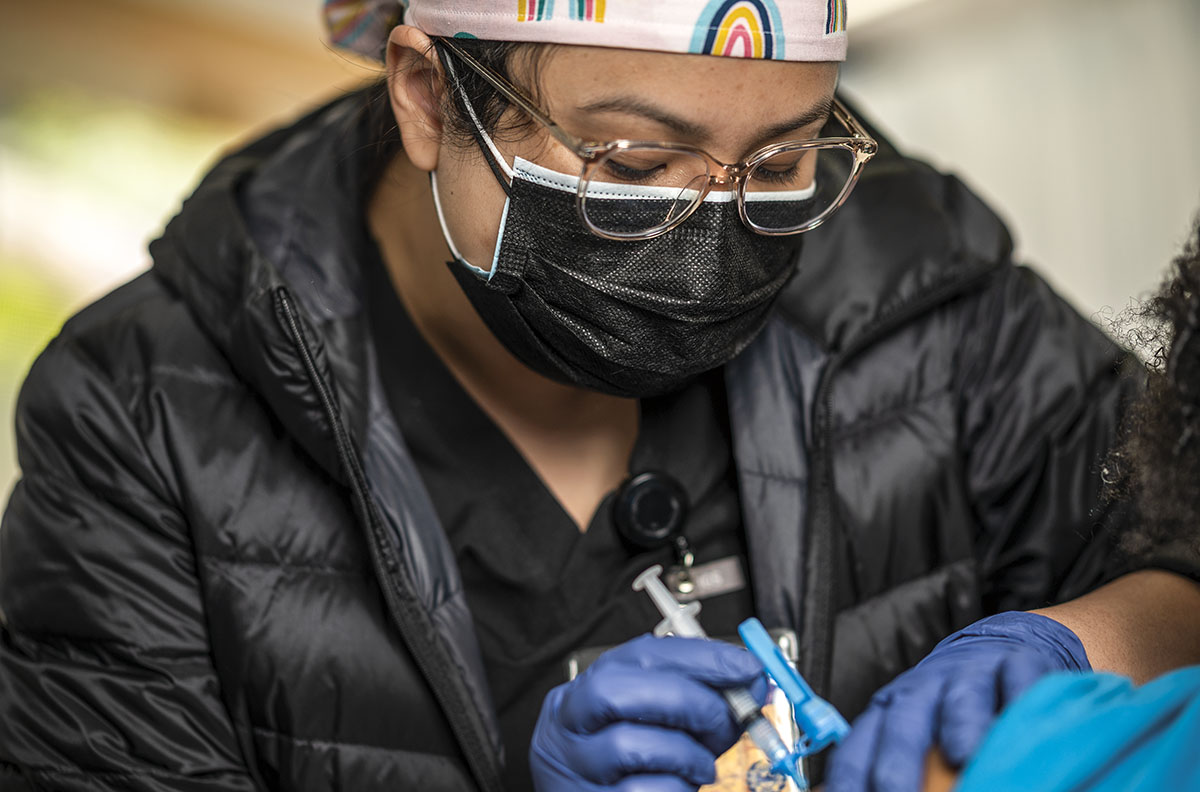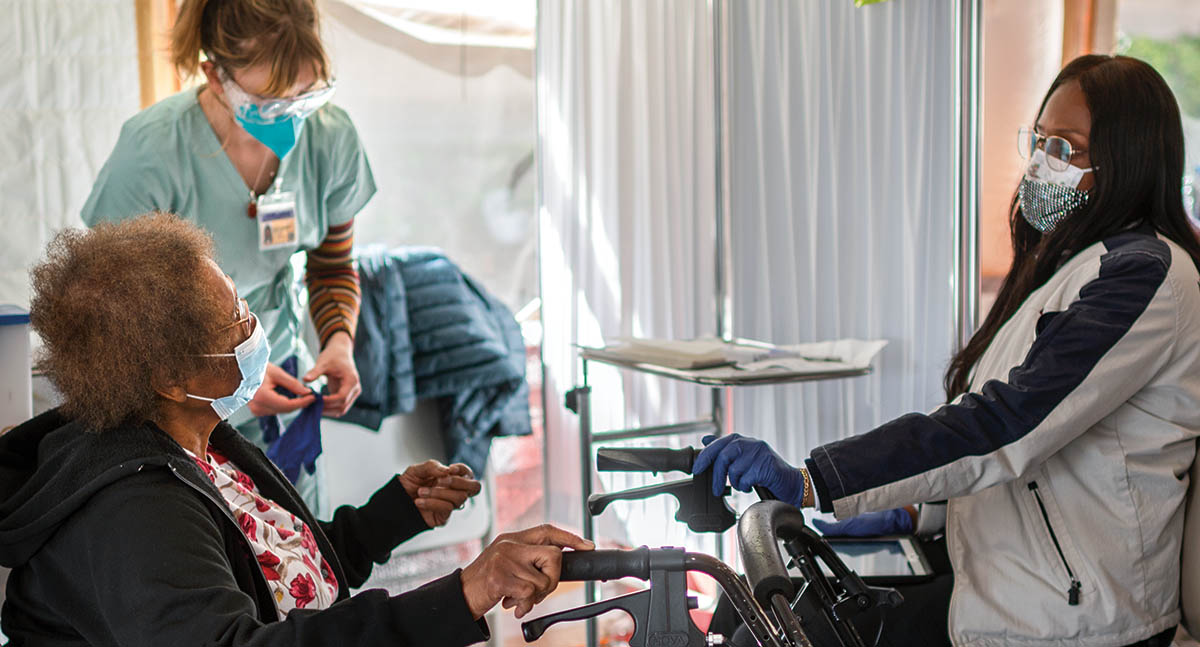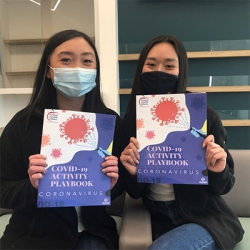
By teaming up with the city’s health department to fight COVID-19, SF State Nursing students are learning by doing
By Michael S. Broder
When there’s a crisis, San Francisco State University students step up — and the COVID-19 crisis hasn’t been an exception. Since last summer, more than 165 Nursing students have been placed with the San Francisco Department of Public Health (SFDPH) at San Francisco health centers, initially helping with testing and later administering vaccines when they became available. Through this community service, Nursing students are bolstering a public health workforce that’s been stretched thin by the pandemic while gaining valuable field experience.
Nursing Lecturer Larry Vitale is the clinical placement coordinator for the School of Nursing. In March 2020, he contacted Tomás Aragón, who then served as San Francisco’s health officer and now directs the California Department of Public Health. Vitale asked Aragón how San Francisco State’s corps of Nursing students could contribute to the COVID-19 prevention effort. Aragón, foreseeing a growing need for staffing, contracted with Vitale to join the newly established office of student placement in SFDPH. In this role, Vitale was able to bring in a summer cohort of Nursing master’s students, all of whom were enrolled in a community and public health practicum, to meet the rising need for COVID testing.
“Our students were there to catch the ball and run with it. In the summer, it was San Francisco State Nursing students that played a really large role in opening up community testing sites in the Mission [and] the Tenderloin,” Vitale says.
From late summer into fall, students performed COVID testing at five San Francisco health centers, and some students still continue to administer tests. During the Fall semester, a new challenge emerged: There was fear of flu outbreaks among people experiencing homelessness who were living in shelter-in-place hotels. Students administered flu shots at the shelter hotels under the supervision of School of Nursing Clinical Instructors Joyce Al-Islam, Marcia Canton, Allison Gilchrist, Linda Mariscal, Lisa Marlowe and Vitale.
“We got the students involved for two reasons,” Vitale says. “One, to get the flu vaccine into these folks, and two, to figure out how we were going to roll out the COVID vaccine. So it was kind of a trial.”
Vitale arranged for a Spring semester cohort of 65 students to onboard early so they could begin working at clinics in December. They started off giving tests, and by January they were giving vaccinations. As the demand for vaccinations soared throughout the spring, Vitale had the idea of placing not only students enrolled in the clinical practicum but any SF State Nursing student who wanted to volunteer. More than 100 Nursing students answered the call. They recently completed their training and will start work imminently. In addition to administering vaccinations in city health centers, students have recently begun working in mobile teams that travel to hard-to-reach communities where a lot of elderly people reside.

Nursing graduate student Kiefer Cropper (left) dons a pair of gloves as she prepares to vaccinate a community member at Southeast Health Center, while another volunteer takes care of screening and documentation.
“[The SF State students] have been really invaluable to our vaccine rollout,” says Elizabeth Kwan, a University of California San Francisco physician who serves as logistics deputy for SFDPH’s COVID Command Center Vaccine Branch. “Everybody has been very stretched in this pandemic that’s now over a year old. The nurses play this very important role where they are able to do clinical work and nonclinical work, and they have availability beyond what a typical volunteer may have. They’re really integrated into the fabric of our DPH work.”
For the Nursing students, their pandemic service has provided them with learning experiences they wouldn’t have had otherwise. When the University was forced to move to remote instruction midway through the Spring ’21 semester, Nursing master’s student Teena Nguyen and others in her cohort wondered how they would get the clinical experience they needed. Soon, however, they saw it as an opportunity.
“I feel like a lot of us had a change of mindset,” says Nguyen, who has now been vaccinating people for two months. “Instead of thinking that this pandemic is damaging our study or delaying it, it was like, ‘We’re in a pandemic and we’re going to be nursing students. What can we do during this time? What kind of experience can we gain in this very unfortunate but also special time in history?’”
Kiefer Cropper, also a master’s student in Nursing, volunteered on her own with SFDPH last summer doing case investigation and contact tracing among unhoused people on the street and in shelters. She’s been administering vaccines since the start of the Spring ’21 semester.
“I really learned how to pivot,” she says. “Nursing is so on the fly, and you really have to change and adapt all of a sudden, all of the time. Before coming into the program, I wasn’t good at being flexible, but now with the pandemic, I’m better at that.”
For Nguyen, working with lower-income communities at Southeast Health Center and in Bayview-Hunters Point has had a profound impact on where she sees her future as a nurse and the populations she’d like to work with.
“I feel like San Francisco State really prepared me to work in the pandemic — its emphasis on social justice and tackling inequities that people are facing,” she says. “Since the moment I applied to nursing school at SF State, this has been a great emphasis, and that’s the flag I’ve carried with me through this pandemic.”

Good Health Can Be Child’s Play
Learning about COVID-19 can be a double-edged sword: It’s good to stay informed, but it can also make people scared and anxious. This can be especially true for children. One SF State student and her peers had an idea to help with that.
Nursing major Elaine Pham — working with San Jose State University nursing students Tina Tran, Elaine Fu, Liz Nguyen and Vivian Doan — created the “COVID-19 Activity Playbook,” a book designed to help children understand the pandemic in an easy and non-frightening way. Readers also learn ways to prevent catching the virus, like washing their hands. “We added fun images and activities like crossword puzzles and coloring diagrams that will keep kids engaged,” Pham says. “That way they’re getting this information but also retaining it.”
The students created the book with the goal of improving health equity. Copies were primarily distributed in school clinics and other health facilities in one of the areas hardest hit by COVID-19: the historically underserved east side of San Jose, where Pham grew up.
“This partly stemmed from the idea that not everybody has access to health resources, but if it was delivered to schools, children would have the resources and share back with their family,” says Pham, a junior. “I think a lot of people assume that everybody has access to the internet, but for many families, that’s not possible.”
The five women created the book as interns for Community Health Partnership (CHP), a nonprofit that advocates for affordable and accessible health services for diverse and multicultural communities. CHP funded the project, printed about 2,800 copies and distributed them across East San Jose, where the nonprofit is located.
CHP and the students hope to translate the book into more languages, such as Vietnamese and Spanish, and expand distribution to other communities. A sequel focused on COVID-19 vaccine information is also underway.
Through her health promotion classes at SF State, Pham learned that nursing goes beyond providing clinical care. Her instructors stressed the importance of advocating for patients and how nurses are at the frontlines of providing health education. Pham says this perspective was not only instrumental in creating the book but will be crucial throughout her career.
“It doesn’t matter where I end up working as a nurse — one of my main priorities will always be to educate my patients no matter what environment I’m in,” she says. “It’s not just helping them heal but also trying to teach them ways to help protect themselves.”—Kent Bravo